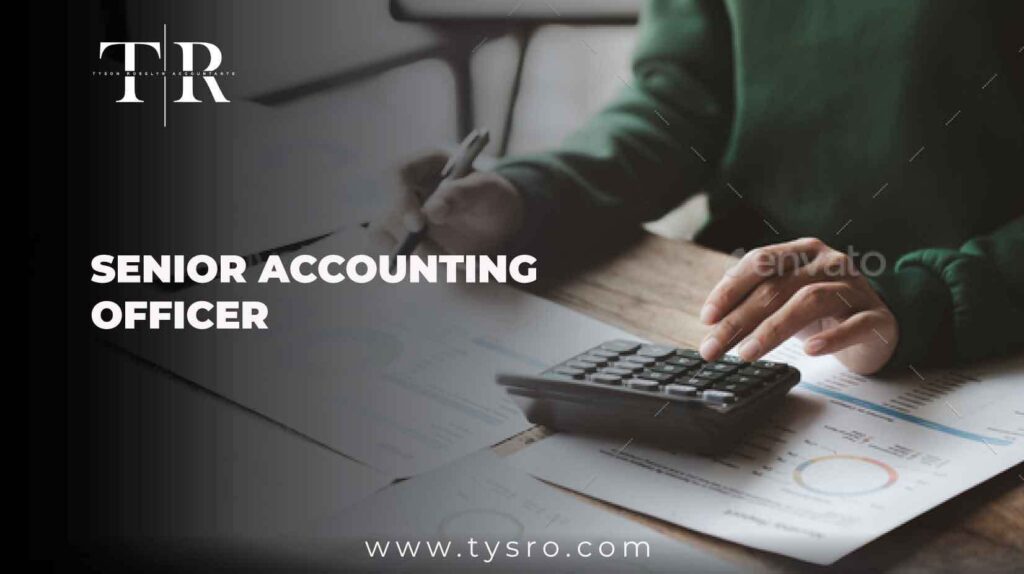Introduction
In today’s fast-paced business world, the role of a Senior Accounting Officer is crucial for maintaining financial stability and ensuring the smooth operation of an organization. Whether you’re looking to step into this role or aiming to understand its importance better, this article will provide a detailed overview, including key responsibilities, necessary skills, and how to excel in this position.
What Does a Senior Accounting Officer Do?
A Senior Accounting Officer oversees the accounting department’s operations, ensuring that all financial activities align with the company’s goals and comply with regulatory standards. Their role includes managing financial reporting, budgeting, and internal controls. They also bridge the finance team and senior management, providing crucial financial insights and advice.
Key Responsibilities
- Financial Reporting: He is responsible for preparing and analyzing financial reports, ensuring accuracy and compliance with accounting standards. This includes balance sheets, income statements, and cash flow statements.
- Budgeting and Forecasting: Developing and managing the company’s budget is a critical aspect of this role. They analyze financial data to forecast future financial performance and make recommendations for adjustments.
- Internal Controls: Implementing and monitoring internal controls to safeguard the company’s assets and ensure accurate financial reporting is essential. This includes conducting audits and reviews to identify any discrepancies or areas for improvement.
- Team Management: Supervising and mentoring junior accountants and finance staff is a key responsibility. This involves training, performance evaluations, and ensuring that the team meets its deadlines and goals.
- Regulatory Compliance: Staying updated on changes in financial regulations and ensuring that the company adheres to legal requirements is crucial. This involves liaising with external auditors and regulatory bodies.
Essential Skills for a Senior Accounting Officer
To excel as a Senior Accounting Officer, certain skills and attributes are essential:
- Technical Accounting Skills: A deep understanding of accounting principles and standards is crucial. This includes knowledge of International Financial Reporting Standards (IFRS) and UK Generally Accepted Accounting Principles (UK GAAP).
- Analytical Skills: The ability to analyze complex financial data and extract meaningful insights is vital. Strong analytical skills help in making informed decisions and recommendations.
- Leadership and Communication: Leading a team effectively and communicating financial information clearly to non-financial stakeholders are key components of the role.
- Attention to Detail: Accuracy in financial reporting and compliance requires a keen eye for detail to prevent errors and omissions.
- Problem-Solving Abilities: Addressing and resolving financial discrepancies and issues promptly is essential for maintaining financial integrity.
A Step-by-Step Guide to Becoming a Senior Accounting Officer
If you aspire to become a Senior Accounting Officer, here’s a step-by-step guide to help you achieve this goal:
- Educational Background: Start with a bachelor’s degree in Accounting, Finance, or a related field. Advanced qualifications such as a Chartered Accountant (CA) or Certified Public Accountant (CPA) can be beneficial.
- Gain Experience: Accumulate relevant work experience in accounting or finance roles. Experience in positions such as Junior Accountant or Financial Analyst will help build the necessary skills and knowledge.
- Develop Expertise: Focus on developing financial reporting, budgeting, and internal controls expertise. Pursue additional certifications or training to enhance your knowledge and skills.
- Enhance Leadership Skills: Take on leadership roles or seek team management opportunities. Demonstrating your ability to lead and mentor others will be crucial in securing a senior position.
- Stay Updated: Keep abreast of changes in financial regulations and industry best practices. Regularly reading financial news and attending professional development courses will help you stay informed.
- Apply for Senior Roles: Once you have the necessary experience and qualifications, start applying for Senior Accounting Officer positions. Tailor your resume to highlight your relevant skills and achievements.
Real-Life Example: A Journey to Becoming a Senior Accounting Officer
Take the example of Emma, who started her career as a junior accountant at a small firm. Over the years, she gained valuable experience and pursued additional qualifications, including a CPA certification. Emma took on various leadership roles, managing teams and leading financial projects. Her dedication and expertise eventually led her to a Senior Accounting Officer position at a major corporation. Emma’s journey highlights the importance of experience, continuous learning, and leadership in achieving this role.
Why Invest in a Senior Accounting Officer?
Investing in a skilled Senior Accounting Officer can provide numerous benefits for a company, including:
- Improved Financial Accuracy: With their expertise, they ensure accurate financial reporting and compliance, reducing the risk of errors and legal issues.
- Strategic Financial Planning: Their insights and analysis help in making informed financial decisions and strategic planning.
- Enhanced Internal Controls: They implement robust internal controls to protect the company’s assets and improve financial integrity.
Conclusion
Becoming a Senior Accounting Officer requires a combination of technical expertise, leadership skills, and a commitment to continuous learning. By following the steps outlined in this guide and focusing on developing the necessary skills, you can position yourself for success in this pivotal role. Investing in a Senior Accounting Officer can significantly benefit a company by ensuring accurate financial management and strategic planning.
For more information on financial reporting and compliance standards, visit IFRS and UK GAAP.


